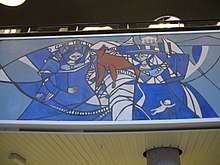Kai Fjell

Kai Breder Fjell (Swedish pronunciation: [ˈkaɪ ˈfjɛl], March 2, 1907 – January 10, 1989) was a Norwegian painter, printmaker and scenographer.[1]
Personal life
Fjell was born on a farm in the village Skoger near Drammen. His father was a farmer and a painter, Conrad Bendiks Fjeld. His mother was a sister of Marie Hamsun. Fjell married Ingeborg Helene Holt in 1931. They had two children, Sindre and Håvard Fjell.
Career
Kai Fjell became a pupil of Carl von Hanno in Oslo in 1926. A year later, he enrolled at the State's School of Art and Design of Oslo, where his main teachers were August Eiebakke and from 1929 Olaf Willums.
His debut exhibition in Oslo Art Society in 1932 was largely unsuccessful. Fjell achieved immediate success with his exhibition at Kunstnernes Hus (The Artists' House) in 1937, where all the exhibited paintings were sold.
Kai Fjell early developed an ornamental expressionism. His pictures are heavily influenced by rural life and traditional Norwegian folk art.
Fjell's early paintings are dominated by dark and earthy hues and often has grotesque motifs (titles include The Violent Man, The Self-killer, The Hearse). His later works are significantly brighter, more daring in their use of colour, and tranquil in mood. Throughout his long career, the female figure and various fertility-symbols are recurring motifs in Fjell's pictures.
Kai Fjell died in his home at Lysaker. He was active as a painter until the end of his life.
Selected works
- 1937 — The Calf Rises
- ["refugees", literal translation]"Flyktninger" - 1939[2]
- 1940 — Reading Woman
- 1942 — The Widow
- 1943
- ["refugees return home", literal translation]"Flyktninger vender hjem" - 1944[2]
- Other paintings during the World War II were
- ["un-peace", literal translation]"Ufred" and ["order for reservists to report for military service", literal translation]"Mobiliseringsordre"[2]
- 1947 — The Violin
- 1952 — Adorning The Bride
- 1970 — Self Portrait
- 1981 - Disco Party